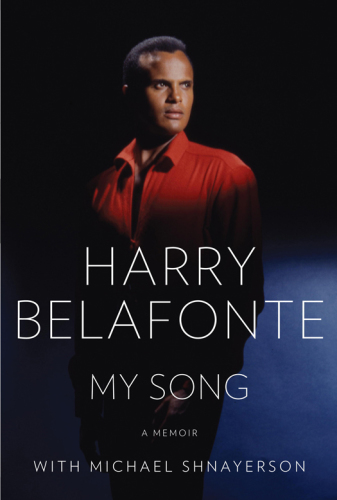
My Song
A Memoir
کتاب های مرتبط
- اطلاعات
- نقد و بررسی
- دیدگاه کاربران
نقد و بررسی

September 26, 2011
Belafonte, actor and activist, whose voice is known to millions for his opening line, “Day-O!” to “The Banana Boat Song,” stepped out of a life of poverty and up to a microphone in the late 1940s, launching a brilliant career as a singer, actor, and activist. With lyrical grace, he chronicles his life from early childhood—where a violent father made life difficult for him, his brother, and his mother—and his first singing engagements, to the difficulties in his own marriages, the grueling life on the show circuit, and his later involvement in the civil rights movement and other social causes. After his hitch in the service, he enrolls in acting lessons with the American Negro Theater, where he meets his life-long friend, Sidney Poitier, and numerous other influential black actors. On a cold January night in 1949, the owner of the Royal Roost night club in New York asks Belafonte to sing a few numbers during intermission for Lester Young’s band; astonished and anxious, the young singer steps onto the stage and finds himself backed by Max Roach, Charlie Parker, Al Haig, and Tommy Potter, four of jazz’s greatest musicians, and his musical career takes off. These musicians’ generosity instill the same compassion in him, and his encounter with great concert singer, athlete, and actor Paul Robeson teaches him that he can use his music and his concerts as pulpits for important causes. Belafonte sometimes exhausts with too many details, but he mostly carries us liltingly along with his song that the best times always lie ahead as long as we take care of each other.

Starred review from September 1, 2011
The noted entertainer and activist looks back over his tumultuous life.
Being the first singer to sell 1 million copies of an album (Calypso in 1956) and writing his own ticket at the otherwise segregated Riviera in Las Vegas did little to assuage Belafonte's fury at the discrimination he had experienced before he made it big. Nor had the emotional scars healed from a poverty-stricken childhood with a severely depressed, impossible-to-please mother, he acknowledges in this forthright memoir, ably co-authored by veteran reporter Shnayerson (Coal River, 2008, etc.). Not until he met Martin Luther King Jr. in 1956 did Belafonte find a way to channel his rage into the larger struggle for racial justice. He would become as well known for his unswerving commitment to civil rights as for his records and concerts. He planned strategy with King; funded the young rebels at the Student Nonviolent Coordinating Council; acted as a liaison to the hesitant Kennedy administration; and recruited the celebrity-studded lineup for the March on Washington. Though never as big a movie star as his friend Sidney Poitier, about whom he writes with equal parts affection and competitiveness, Belafonte also had some successes in film, most notably opposite Dorothy Dandridge in Carmen Jones (1954) and in Robert Altman's Kansas City (1996). He recounts these highlights, as well as three marriages, four kids, a half-century in Freudian analysis, and lots more, with frankness and bite. He has mellowed not at all in old age, calling George Bush a terrorist in 2006 and judging President Obama to be insufficiently compassionate and committed to the poor. Yet Belafonte's bluntness and vast ego aren't too hard to take, since they are so often applied to the service of others, not just in the '50s and '60s but into the '80s with the "We Are the World" video for African famine relief and currently in his Gathering for Justice project to train minority youths in nonviolent activism.
Bracingly opinionated autobiography from an American original, still provocative in his ninth decade.
(COPYRIGHT (2011) KIRKUS REVIEWS/NIELSEN BUSINESS MEDIA, INC. ALL RIGHTS RESERVED.)

September 15, 2011
Belafonte has lived his life juggling culturesWest Indian and American, black and white, poor and rich. He used the considerable skill he acquired thereby to cross the racial divide as a performer and as an activist. He recalls how involvement in the nonviolent civil rights movement, along with therapy, helped him quell the anger lingering from an early life of grinding poverty. His childhood was tumultuous, as he traveled between Harlem and Jamaica, learning the harsh lessons of American racism. Following a stint in the navy, he used the GI bill to enroll in acting school, where Marlon Brando was among his classmates. There were few prospects for black actors, but he got a break that launched his singing career. But he never forgot the anger borne of poverty and racial injustice, using his celebrity to gain financial and other support for the civil rights movement, once traveling to the South with Sidney Poitier to deliver $70,000 in cash to those fighting for voting rights. Belafonte looks back on a fascinating life and career and friendships with notables from Paul Robeson to Nelson Mandela. HIGH-DEMAND BACKSTORY: Knopf is banking on the wide appeal of Harry Belafonte's rags-to-riches memoir with a 150,000-copy first printing and an 11-city tour.(Reprinted with permission of Booklist, copyright 2011, American Library Association.)

























دیدگاه کاربران